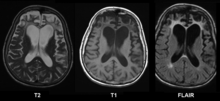User:Mr. Ibrahem/Frontotemporal dementia
| Frontotemporal dementia | |
|---|---|
| Other names | Frontotemporal degeneration disease,[1] frontotemporal neurocognitive disorder[2] |
 | |
| Brain MRI of a female of 65 years with frontotemporal dementia. Cortical and white matter atrophy of the frontal lobes is clear in all images. | |
| Specialty | Psychiatry, neurology |
| Symptoms | Personality changes, lack of emotions, repetitive behavior, loss of vocabulary, decreased ability to understand language[3][4] |
| Usual onset | 50s and 60s[5] |
| Types | Behavioral variant (bvFTD), semantic variant (svPPA), nonfluent variant (nfvPPA)[6][7] |
| Causes | Unknown[8] |
| Risk factors | Family history, head injury, thyroid disease[6][4] |
| Diagnostic method | Based on symptoms and MRI[5] |
| Differential diagnosis | Alzheimer, vascular dementia, Lewy body dementia, alcoholism[4] |
| Treatment | Supportive care[5] |
| Prognosis | Life expectancy 7.5 yrs[4] |
| Frequency | 2 per 10,000 (45 to 65 year old)[5] |
Frontotemporal dementia (FTD) encompasses several types of dementia involving the frontal and temporal lobes.[3][6] The primary symptoms generally involve behavior or language.[6] This may include personality changes, lack of emotions, repetitive behavior, loss of vocabulary, and decreased ability to understand language.[3][4] They generally start gradually and worsen over several years.[5] Memory and motor functions often remain relatively preserved.[3]
The cause is unknown.[8] Risk factors include family history, head injury, and thyroid disease.[6][4] The underlying mechanism involves loss of neurons, primarily spindle neurons.[4][9] There are three main subtypes: behavioral variant (bvFTD) and two types of primary progressive aphasia - semantic variant (svPPA) and nonfluent variant (nfvPPA).[6][7] Related disorders include progressive supranuclear palsy, corticobasal syndrome, and FTD with amyotrophic lateral sclerosis (FTD-ALS).[5]
There is no cure.[8] Management may require social supports, behavioral therapy, and speech therapy.[4] Other efforts to improve symptoms may include SSRIs, antipsychotics, and galantamine.[8] A number of treatments are under study.[4] The average life expectancy is 7.5 years after diagnosis.[4]
FTD newly affects per year about 2 per 100,000 people in their 40s, 3 per 100,000 in their 50s, and 9 per 100,000 in their 60s.[4] Before the age of 65, it is second only to Alzheimer's disease (AD) in frequency.[5] Those in their 40s to 60s are most commonly affected.[5] Males and females are affected equally frequently.[5] It was first described by Arnold Pick in 1892 and was originally called Pick's disease, a term now reserved for bvFTD.[10][8]
References[edit]
- ^ Perez, L., "Ron Oberman, Senior Record Executive and Former Publicist to David Bowie, Dies at 76" Archived 2021-05-07 at the Wayback Machine, The Hollywood Reporter, November 24, 2019.
- ^ Diagnostic and statistical manual of mental disorders : DSM-5 (5th ed.). Arlington, VA: American Psychiatric Association. 2013. pp. 614–618. ISBN 9780890425541.
- ^ a b c d "ICD-11 - Mortality and Morbidity Statistics". icd.who.int. Archived from the original on 2018-08-01. Retrieved 2020-10-17.
- ^ a b c d e f g h i j k Khan, I; De Jesus, O (January 2021). "Frontotemporal Lobe Dementia". PMID 32644712.
{{cite journal}}: Cite journal requires|journal=(help) - ^ a b c d e f g h i Finger, EC (April 2016). "Frontotemporal Dementias". Continuum (Minneapolis, Minn.). 22 (2 Dementia): 464–89. doi:10.1212/CON.0000000000000300. PMID 27042904.
- ^ a b c d e f Sivasathiaseelan, H; Marshall, CR; Agustus, JL; et al. (April 2019). "Frontotemporal Dementia: A Clinical Review". Seminars in Neurology. 39 (2): 251–263. doi:10.1055/s-0039-1683379. PMID 30925617. Archived from the original on 2021-08-28. Retrieved 2020-12-30.
- ^ a b "What is frontotemporal dementia". Dementia UK. Archived from the original on 17 April 2021. Retrieved 19 October 2020.
- ^ a b c d e Cardarelli R, Kertesz A, Knebl JA (December 2010). "Frontotemporal dementia: a review for primary care physicians". Am Fam Physician. 82 (11): 1372–7. PMID 21121521. Archived from the original on 2021-03-04. Retrieved 2014-08-31.
- ^ "Brain Cells for Socializing". Smithsonian. Archived from the original on 22 March 2021. Retrieved 30 October 2015.
- ^ "What are the Different Types of Frontotemporal Disorders?". National Institute on Aging. Archived from the original on 9 July 2021. Retrieved 1 November 2020.
